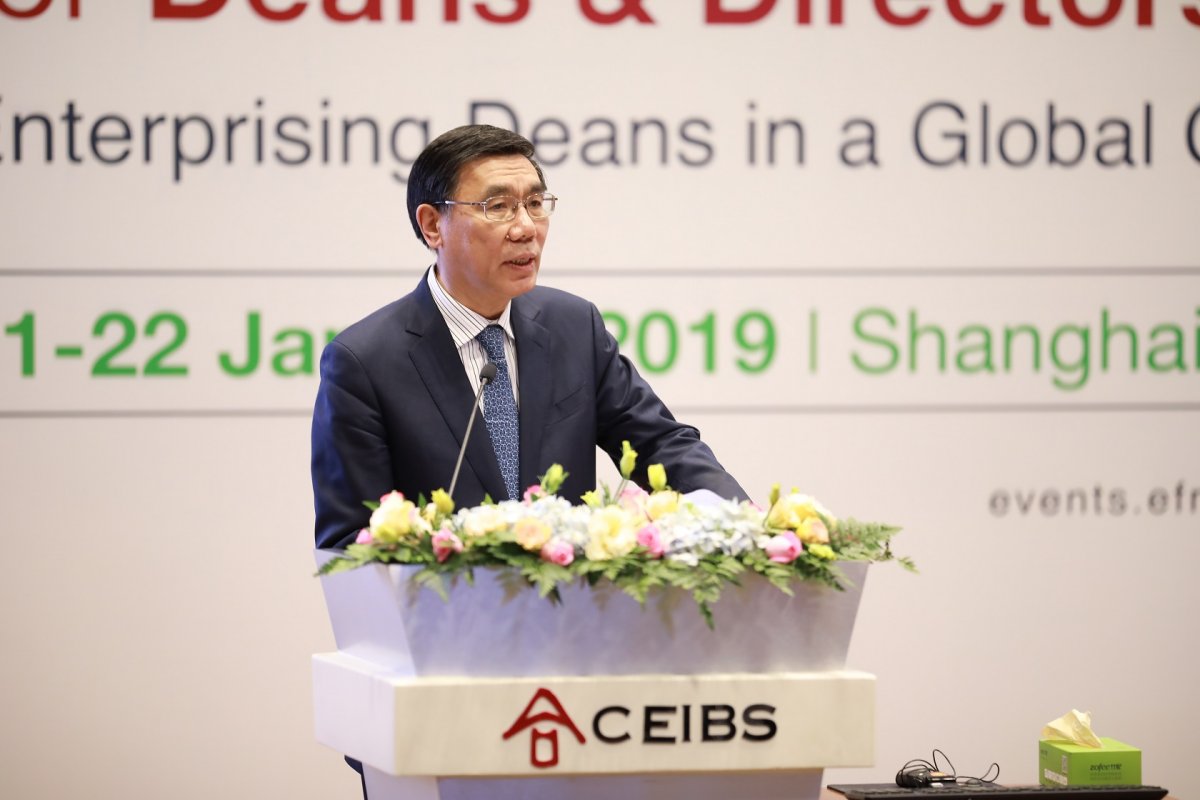B-Schools at a Crossroads, Says Former ICBC Chairman
January 22, 2019. Shanghai – Nearly 300 deans and other leaders from business schools around the world gathered in the Shanghai Petrochemical Auditorium at the CEIBS Shanghai Campus today to hear Former ICBC Chairman, CLIIF Director, and CEIBS Adjunct Professor of Finance Jiang Jianqing give a talk on The Logic behind the Evolution of International Finance & Journey of China’s Financial Reform. Professor Jiang’s presentation kicked off a second day of lectures, panel discussions, and workshops as part of the 2019 EFMD Conference for Deans & Directors General. Keeping with the event’s overall theme of Enterprising Deans in a Global Context, Prof. Jiang offered participants a look at some of the ways in which globalisation is driving recent trends in the banking industry and, moreover, the types of opportunities and challenges these trends represent for business schools.
While noting that “business schools around the world have historically played a pivotal role in advancing globalisation, commercial progress, and world prosperity,” Prof. Jiang stated that “our society, economy, and the financial industry are all at a crossroads today and we have to think hard where we should be headed in the future. Business schools are also at a crossroads and have to make a decision about the right way forward.” To this end, he called on school leaders to encourage more research, advance the case study method of teaching, and create more opportunities for students to learn from hands-on experience.
As an example of a research opportunity, Prof. Jiang pointed to the 2008 global economic crisis. Specifically, he explained that despite being called into serious question in the wake of the crisis, the western financial world has largely continued to embrace a ‘too big to fail’ mentality, going further down the road towards an increasing concentration of the banking sector.
“This phenomenon is not limited only to the banking industry, but is widespread in many other industries, such as express delivery, e-commerce, and financial asset management, and it is an issue worthy of further investigation by business school researchers,” he said. “Appropriate levels of concentration can be beneficial for economies of scale, resilience to risks, and regulatory efficiency. However, the tipping point must be identified to prevent adverse impacts.”
Drawing on his own extensive experience in handling the “tricky business” of mergers and acquisitions – a process he described as both “a science and an art” – Prof. Jiang also emphasised the urgent need for business schools to bring more real world examples into the classroom.
“Teaching must be based on cases, real cases from the business world,” he said. “Of course, we then need to encourage students to draw useful lessons or develop workable theories from those cases.”
Finally, Prof. Jiang shared with the audience some thoughts on how schools can proceed if they are to successfully incorporate financial (and other) courses into their curricula.
“Business schools should [also] make sure students can draw useful lessons and theories from best practices and learning must come from hands-on experience,” he concluded. “We are living in a fast-changing world, where knowledge has a much shorter shelf life. [As a result,] schools must stay current with the latest developments in the business world, and make sure students are fully exposed to them.”
For more news and highlights from the 2019 EFMD Conference for Deans & Directors General and other events hosted by CEIBS, visit our News & Events page here.













